- View All
- Topics
- Search
Topics
- Alumni
- Book Recommendations
- Child Tax Credit
- Coding
- College Admissions
- College Counseling
- Community
- Cultural Learning
- Curriculum
- Distance Learning
- Earth Day
- Engineering
- Fundraising
- Giving
- High School
- International Women's Day
- Mandarin Bilingual Preschool
- Mandarin Language Programs
- Mindful Parenting
- Mindfulness
- National Women's History Month
- Parenting
- Parenting Support
- Poetry
- Potty Training
- Preparing for College
- Preparing for Preschool
- Reading
- STEAM
- STEM
- Student Awards
- Student Spotlight
- Teacher
- Teacher Awards
Blog Archive
-
2024 (4)
-
March (3)
- Stratford Preparatory Blackford Middle and High School Students Recognized at Multiple Competitions and Events in March
- Stratford Fremont and Pleasanton Middle School Students Bring Home 46 Science Fair Awards at the Alameda Science and Engineering Fair!
- Stratford Mandarin Language Students Win Multiple National Chinese Culture Competitions!
- January (1)
-
March (3)
-
2023 (5)
- September (1)
- June (1)
- April (1)
- February (2)
-
2022 (11)
- November (1)
- August (1)
- July (1)
- June (1)
- May (1)
- March (2)
- February (3)
- January (1)
-
2021 (23)
- December (2)
- November (1)
- October (2)
- September (1)
- August (2)
- July (2)
- June (4)
- May (1)
- April (3)
-
March (4)
- What Families Need to Know About Child Care Benefits in the “American Rescue Plan Act”
- Inside Out: Fostering Emotional Intelligence (EI) in your Child
- Celebrating Women’s Contributions to History One Book at a Time
- Stratford School Congratulates Our 2021 Future City Engineering Competition Participants and Winners!
- February (1)
-
2020 (9)
- December (1)
- September (1)
- August (1)
- May (1)
- April (3)
- March (2)


Cultivating Coding Skills in Kids
Why Coding is the Essential New Educational Literacy and How Starting Early Can Make All The Difference for Your Child
Introducing Coding Concepts in Preschool
At Stratford School, we start early — building the foundation of critical thinking and coding skills in preschool. In a quickly changing world that is defined by new technology innovations, we want our students to be prepared for whatever comes next. By starting early we can ensure that our students are actively engaged in coding during the elementary years and mastering computer programming by middle school.
According to the National Association of Education of Young Children (NAEYC), incorporating coding in an early learning setting can immerse children in activities that will also align with content standards in areas like math, problem-solving, communication, and literacy. Introducing coding at an early age is an essential step in helping children learn and master the skill of computational thinking. This gives them the tools to learn how to break down a problem into smaller problems in order to find an optimal solution. Listing out the steps in a logical way to find a solution is called algorithmic thinking. Coding, computational thinking, and algorithmic thinking are important life skills that every student in our modern world should learn in order to succeed.
Coding Games Teach Critical Thinking
“Cinderella moves step-by-step on the path that will take her home before midnight. She pauses to wonder, is this the right path? Will I reach home sooner if I take the other path? But she decides to follow the path that the children have chosen for her and she reaches home on time, Woohoo! Yay!” We hear giggles, laughter, and clapping from inside the classroom. This is the sound of happy Stratford Preschool students learning how to code!
In preschool, we use fun, age-appropriate tools like Beebots and Dash and Dot robots to help teach algorithmic and computational thinking skills. Dash and Dot robots are often used during storytime, where Dash gets to play a character in the story and has a challenge to finish. Dash played the role of ‘Cinderella’ and when presented with two paths, students were challenged to figure out which one was the fastest in order to reach home before midnight. While it may seem like a fun storytime activity, through these coding games students are actively learning to apply critical thinking skills, compare different solutions, and choose the best option. Children walk the teacher through the steps and the teacher adds the blocks of code in front of them to give a visual point of reference.
Building Solid Computer Skills Through Coding During the Elementary Years
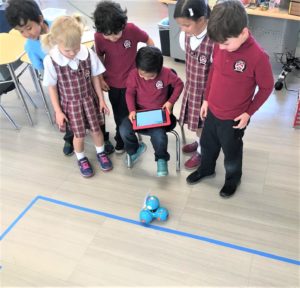 Starting in elementary school, our students are on the path toward becoming technology innovators rather than simply passive technology users. Once Stratford students reach first grade, they are eager to attend Computer Science class twice a week. Building on the skills learned in preschool and kindergarten, students now learn to code using Tynker, a block programming software. They can relate the vocabulary terms learned in preschool and start applying the concepts in a hands-on programming environment. Students also learn about the hardware components inside the computer and the functionalities of each component in order to understand “how computers work”. Our Computer Science teachers scaffold and strengthen the fundamental computer science concepts year-over-year with a variety of exciting teacher-led and independently driven student projects. Projects may include creating simulations of the Butterfly Life Cycle or the Solar System, enhancing storytelling with a Mad Libs game, learning simple math operations and mathematical inequalities with a hi-low game, creating a simple 2D landscape with Turtle graphics, and much more.
Starting in elementary school, our students are on the path toward becoming technology innovators rather than simply passive technology users. Once Stratford students reach first grade, they are eager to attend Computer Science class twice a week. Building on the skills learned in preschool and kindergarten, students now learn to code using Tynker, a block programming software. They can relate the vocabulary terms learned in preschool and start applying the concepts in a hands-on programming environment. Students also learn about the hardware components inside the computer and the functionalities of each component in order to understand “how computers work”. Our Computer Science teachers scaffold and strengthen the fundamental computer science concepts year-over-year with a variety of exciting teacher-led and independently driven student projects. Projects may include creating simulations of the Butterfly Life Cycle or the Solar System, enhancing storytelling with a Mad Libs game, learning simple math operations and mathematical inequalities with a hi-low game, creating a simple 2D landscape with Turtle graphics, and much more.
Students in Grades 1 to 3 also get to work with the innovative Makey-Makey kits where they learn how to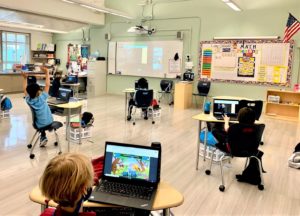 turn everyday objects into computer input devices, fostering their design-thinking and creative problem-solving skills. Then, by Grade 4, students are able to transition from block coding software to text programming in Python. This is also the time when our students are introduced to the exciting world of Finch robots. This gives them the opportunity to see the application of their programming accomplishments in action when the robots move and finish challenging tasks like drawing a line or square, etc. based on the program they wrote in Python.
turn everyday objects into computer input devices, fostering their design-thinking and creative problem-solving skills. Then, by Grade 4, students are able to transition from block coding software to text programming in Python. This is also the time when our students are introduced to the exciting world of Finch robots. This gives them the opportunity to see the application of their programming accomplishments in action when the robots move and finish challenging tasks like drawing a line or square, etc. based on the program they wrote in Python.
Technology Innovators by Middle School
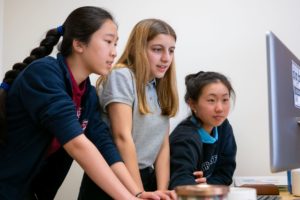 In middle school, Stratford students progress quickly into developing and programming games, apps, and websites. They learn object-oriented programming concepts beginning with Scratch and then progress to designing and developing games using Pygames in Python and GameMaker. They learn to build web pages using HTML/CSS and Javascript, how to develop Mobile Apps using AppInventor, and discover the workings of motors and sensors with Raspberry Pi. Stratford’s Computer Science curriculum has been carefully developed based on the CSTA (Computer Science Teachers Association) and ISTE (International Society for Technology in Education) standards.
In middle school, Stratford students progress quickly into developing and programming games, apps, and websites. They learn object-oriented programming concepts beginning with Scratch and then progress to designing and developing games using Pygames in Python and GameMaker. They learn to build web pages using HTML/CSS and Javascript, how to develop Mobile Apps using AppInventor, and discover the workings of motors and sensors with Raspberry Pi. Stratford’s Computer Science curriculum has been carefully developed based on the CSTA (Computer Science Teachers Association) and ISTE (International Society for Technology in Education) standards.
Many of our middle school students choose to participate in a variety of national and global competitions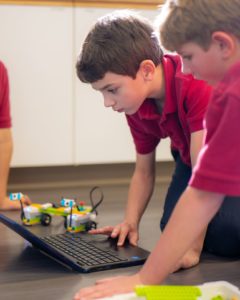 like the American Computer Science League (ACSL) Challenge, Technovation Challenge, and a variety of hackathons. Stratford students have placed in the top tier in ACSL contests. Teams that have participated in the Technovation Challenge in the past years have created apps that help young dyslexic students learn to spell words; game-based apps that bring awareness about protecting the environment; apps to adopt pets from shelters; and more. One of our students, Jacob Trentini from Stratford Middle School in Pleasanton, created the “Fume” app, currently available in the mobile app store, that identifies the amount of healthy air in a particular area. Read more about Jacob and his ingenious new app in The Independent News. Furthermore, Stratford Middle School students have won multiple awards from programming projects presented in the prestigious Synopsys Science Fair and Broadcom MASTERS competitions.
like the American Computer Science League (ACSL) Challenge, Technovation Challenge, and a variety of hackathons. Stratford students have placed in the top tier in ACSL contests. Teams that have participated in the Technovation Challenge in the past years have created apps that help young dyslexic students learn to spell words; game-based apps that bring awareness about protecting the environment; apps to adopt pets from shelters; and more. One of our students, Jacob Trentini from Stratford Middle School in Pleasanton, created the “Fume” app, currently available in the mobile app store, that identifies the amount of healthy air in a particular area. Read more about Jacob and his ingenious new app in The Independent News. Furthermore, Stratford Middle School students have won multiple awards from programming projects presented in the prestigious Synopsys Science Fair and Broadcom MASTERS competitions.
Celebrating Hour of Code
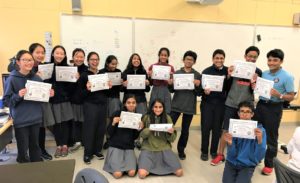 Every year in December during Computer Education Week, we celebrate Hour of Code — a global event that highlights Computer Science Education. From preschool to middle school, each and every Stratford student participates in this annual Hour of Code event. Visit the Hour of Code website to learn more.
Every year in December during Computer Education Week, we celebrate Hour of Code — a global event that highlights Computer Science Education. From preschool to middle school, each and every Stratford student participates in this annual Hour of Code event. Visit the Hour of Code website to learn more.
In addition to the dynamic classroom activities, we invite guest speakers from our parent community to come and share their experiences working in the high-tech and innovative technologies industries in a broad range of fields — from medicine to virtual reality. It is an enriching and energizing experience for our students to see the real-life applications of the skills that they are learning in their Computer Science class.
Whatever field of study or career that our students choose to pursue, we feel confident that they will be well prepared with the extensive coding skills that they have developed through our Computer Science program. Stratford students will be ready to make their mark on the world as the creative thinkers, innovative problem-solvers, and influential change-makers of tomorrow.
Written by Vidya Janardhanan
Curriculum & Innovation Specialist and Middle School Computer Science Teacher
Stratford School
Learn more about Stratford School’s innovative Preschool, Elementary, Middle, and High School curriculum! Visit our website at www.stratfordschools.com or click here to schedule a personalized tour for one of our campuses or our Online Academy.